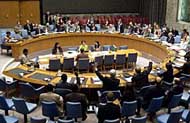World leaders resist concrete targets to fight AIDS at U.N. conference
World leaders resisted setting exact financial targets for the fight against AIDS at a major conference Friday, drawing criticism from activists who claimed they do not want to shoulder the financial burden of trying to stop the virus.

Rights groups also said there were some gains from the conference, including a push for drug users to be given sterile injecting equipment and recognition that the fight against AIDS will require up to US$23 billion (Ђ18 billion) each year by 2010.
The meeting was meant to review efforts to fight AIDS and prepare national plans to fight the virus over the next 10 years. It came after a U.N. report said that 40 million people worldwide are living with HIV/AIDS, and 8,000 die every day from the virus.
"The epidemic continues to outpace us," U.N. Secretary-General Kofi Annan said. "Last year, globally, there were more new infections than ever before, and more people died than ever before."
Overall, activists said the nonbinding final declaration was a missed opportunity, and 69 groups denounced it outright. They said it lacked the kind of bold, galvanizing proposals included in a plan of action that was agreed to at a similar conference in 2001.
The resistance to financial targets came mostly from the leading donor nations, including the United States, the European Union, Japan and Australia, who feared that if they set goals for AIDS funding, they would be the ones expected to bear the biggest burden.
They settled for a promise to set "ambitious national targets" in 2006 so nations can reach universal access to prevention, treatment, care and support by 2010. The world spent US$8.3 billion (Ђ6.5 billion) to fight AIDS in 2005.
Civil rights groups acknowledge that few of the earlier goals were met, but they said those targets provided a yardstick to measure the progress against AIDS, reports AP.
O.Ch.
Subscribe to Pravda.Ru Telegram channel, Facebook, RSS!





